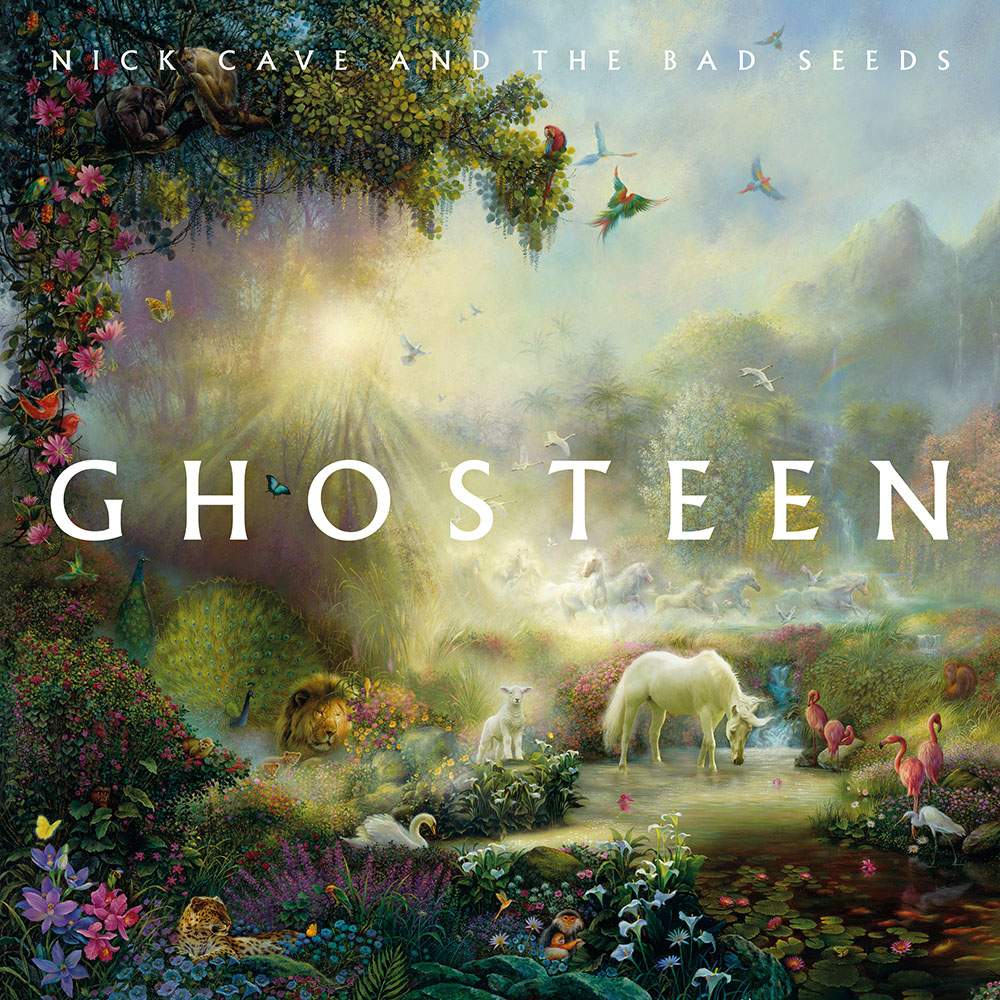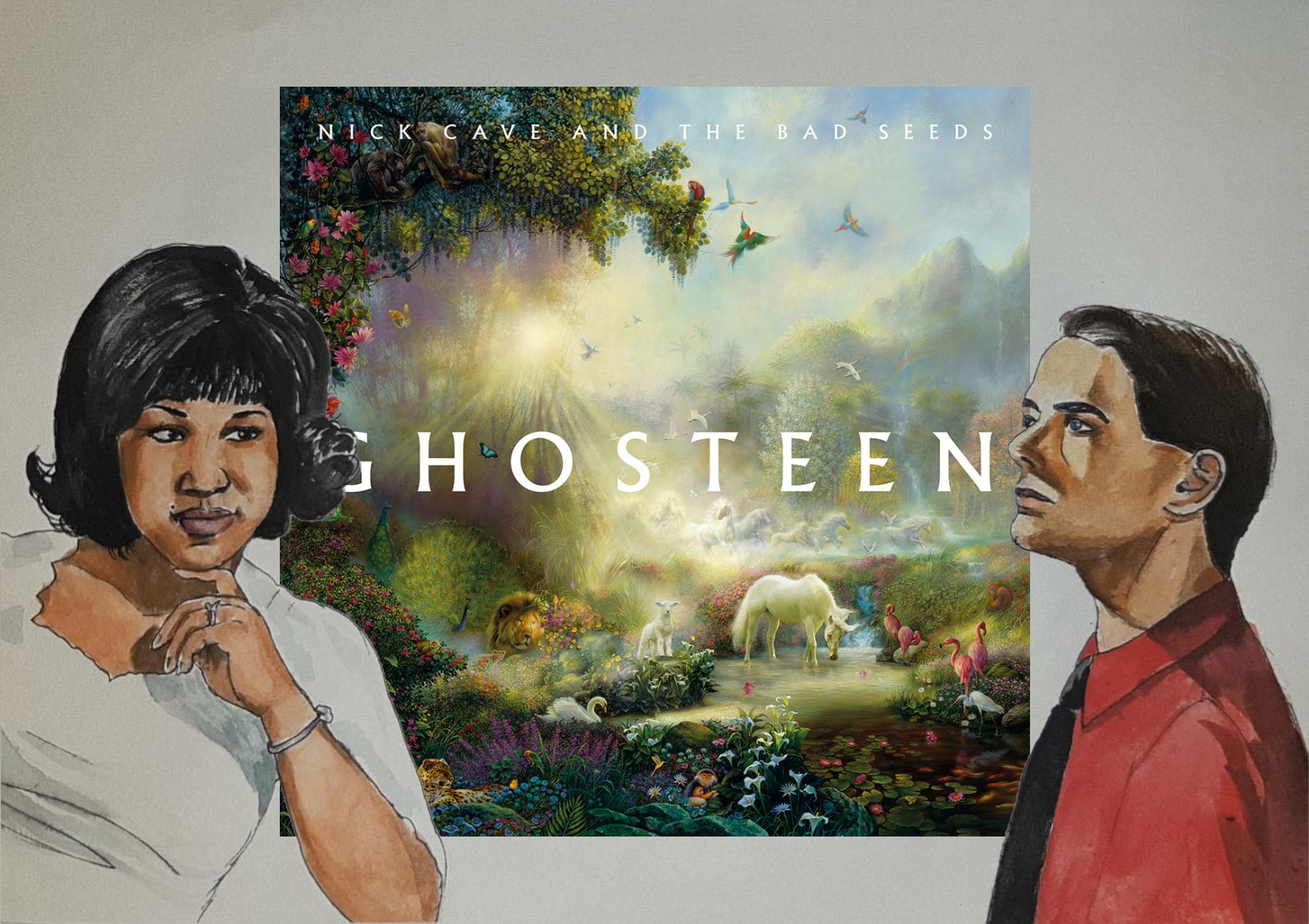
Nick Cave and the Bad Seeds – Ghosteen (Bad Seed, 2019)
Ambient Pop / Singer & Songwriter / Chamber Pop
Working under the philosophy that the appreciation of music is of a very personal and subjective nature, there’s something intriguing in having an artist direct you on how you’re supposed to approach their creation; something even “kinky”, if you’d like, on being given instructions for listening to a project. So, honoring that, I’m going to forego my usual style of reviewing, opting instead for a more personal one. Please bear with me.
Preach like Seeds
First and foremost, I should explain that my approach to this record was equally unorthodox, since for reasons I still can’t comprehend, I decided to perform my second listening of Ghosteen on YouTube and not on a regular streaming service, where I was redirected to the official account of Nick Cave and the Bad Seeds and subsequently, to their latest record. There, I was greeted by a black screen and explained that this was a double record, divided by a two-minute interlude and with a spoken work passage in the second part. “Ghosteen is a migrating spirit”, explains the dark screen and, after a few more seconds, the record starts playing.
From the beginning of the entry track, beautiful bell-like chimes contribute to the building of a spatial atmosphere, to the point in which we can almost feel like we’re sitting in the middle of a circular room, the sound of Tibetan singing bowls bouncing from the walls. And in a way, this feels like a meditative, practically religious experience, with an instrumentation accompanied by choruses one would find attending a eulogy, while Mr. Cave reminds us that “peace will come in time”.
The most prominent thing in “Bright horses” then is the piano, that serves as a maestro around which the rest of the piece is built. The atmosphere of this track suggests that of a post-battle, post-tragedy song; the calmness that comes with loss. String arrangements are further added to the mixture, only to be taken over by voices that will follow the same rhythm, in one of the most interesting song writing moments of the record (“there’s no shortage of tyrants and no shortage of fools”). This song will come to a positive end by suggesting a reunion with one’s lost love, perhaps after death.
However, one could wonder if the track truly ended, since the next one feels like a continuation of it, both in subject as well as instrumentation. “Waiting for you” also refers to someone’s return, very much in line with the overall religious theme of the entire record. Additionally, Nick Cave echoes a sentiment which one can easily empathize with by claiming “Just want to stay in the business of making you happy”.
As the middle point of the first part of this album approaches, the common themes become more noticeable; most songs have a very similar composition, instrumental-wise –synths, bells and strings being the main protagonists– as well as the religious aspects of the lyrics. “Sun forest” is highly representative of this, with its nods to the crucifixion and references to an omnipresent manifestation that we need only make conscious in order to not feel alone, appropriate chanting and organ-like sounds included.
Nothing can be planned
The second half is of a less sombre nature, almost one of flourishing, like in “Galleon ship”, or of a divine calling, as the title of “Ghosteen speaks” suggests. This is perhaps why the dry drumming in “Leviathan” feels like such a contrasting set, as well as the depth that the synth work and the bass lines add to this particular song.
Now comes the interlude, which is a welcome pause amongst the feelings that the previous songs awaken and that prepared me for diving head-first into the mystery of Ghosteen, the elusive figure from which the album’s title stems. It all seems to make sense when we hear “there’s nothing wrong with loving something you can’t hold in your hand”, right before coming to “Fireflies”, a song that directly references one of the most painful moments in the artist’s life —that of his child’s death—, drawing a parallel to virgin Mary’s own grief at the loss of her son in a long spoken word passage, as well as reconciling with a very human sense of helplessness (“nothing can be predicted and nothing can be planned”).
It’s a long way to find peace of mind
The record ends emphasizing the sentiment of yearning that permeates the whole material; a yearning that will hopefully be satiated in another life, or more accurately, in The Afterlife. It also ends on a note of empathy, reminding us that “everybody’s losing someone” and the tragedies that seem to drown us are part of the human experience, just as the synth booms like a pulsating heart in the background.
After this whole journey, one could argue that, in one way or another, all artists indicate how their output should be listened to by the way they arrange the songs in it, but it’s always refreshing to have someone of Nick Cave’s caliber adding to the “lore” comprised in a project like this. On the other hand, it is noteworthy that the instrumentation of this record is perhaps not as interesting as plenty of other records The Bad Seeds have graced us with, yet all in all the atmosphere feels cohesive instead of repetitive. I would end by adding that this record almost demands a certain kind of mood to be listened in, therefore making one’s opinion of it as fluctuating as the migrating spirit itself.
Favourite tracks: Spinning song; Bright horses; Waiting for you; Sun forest; Leviathan.
Least favourite tracks: Night raid.
8/10
Political Sciences BA and Mexican-born expat, trying their best to hold onto their filmmaking dreams. I turn to music and films when existence becomes unbearable






